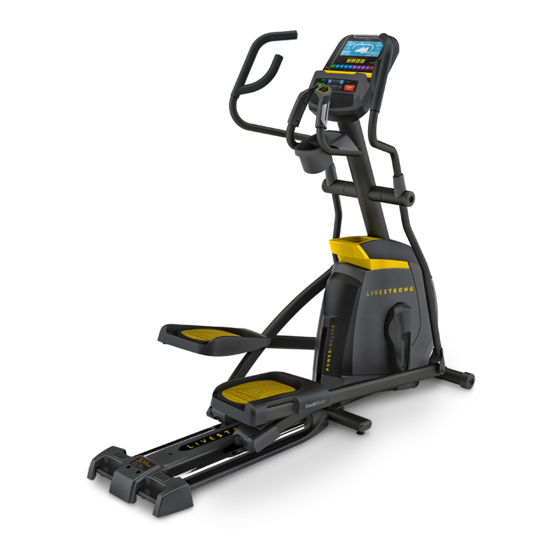
Advertisement
Advertisement
Table of Contents
Troubleshooting

Summary of Contents for Livestrong LS13.0E-02
- Page 1 LS13.0E-02 Service Manual...
-
Page 2: Table Of Contents
TABLE OF CONTENTS CHAPTER 1: SERIAL NUMBER LOCATION Serial Number Location………………………………………………….….……………………………….……3 CHAPTER 2: ENGINEERING MODE Engineering Mode…………………………………….………………………………………….….…………….4 Engineering Mode Overview…………………………………………….…………………………..………..….5 CHAPTER 3: ELECTRONIC DIAGRAMS Electronic Diagram…………………………………….………………………..……………………….…….….6 CHAPTER 4: TROUBLE SHOOTING Troubleshooting – No RPM Displayed…………………………………………………………………………..7 Troubleshooting – No Resistance or Incorrect Resistance……………………………………………...……8 Troubleshooting –... -
Page 3: Chapter 1: Serial Number Location
CHAPTER 1: SERIAL NUMBER LOCATION 1.1 Serial Number Location... -
Page 4: Chapter 2: Engineering Mode
CHAPTER 2: ENGINEERING MODE 2.1 Engineering Mode 1) To enter Engineering Mode, press & hold the LEVEL UP and DOWN keys at the same time for 3-5 seconds until Engineering Menu appears on the display. 2) Use the LEVEL UP and DOWN keys to scroll through a list of parameters. 3) Press the CHANGE DISPLAY / ENTER key to enter a parameter setting. -
Page 5: Engineering Mode Overview
CHAPTER 2: ENGINEERING MODE 2.2 Engineering Mode Overview Mode Function Description GO LCD on STOP LCD off Eng 0 Display Test Press any other key to test for function. Hold “STOP” 3 sec back to “Engineering Menu” Press ENTER to scroll through the options in this menu and LEVEL UP or DOWN to test or change the settings / components below. -
Page 6: Chapter 3: Electronic Diagrams
CHAPTER 3: ELECTRONIC DIAGRAMS 3.1 Electronic Diagram... -
Page 7: Chapter 4: Troubleshooting
CHAPTER 4: TROUBLESHOOTING 4.1 Troubleshooting – No RPM Displayed Symptom: No RPM shown on the console. Reason: 1. Bad connection between the console cable and the console or a damaged cable. 2. The speed sensor wire is damaged or not working. 3. -
Page 8: Troubleshooting - No Resistance Or Incorrect Resistance
CHAPTER 4: TROUBLESHOOTING 4.2 Troubleshooting – No Resistance or Incorrect Resistance Symptom: 1. The resistance is not adjustable during an exercise. 2. The resistance is reverse or much too heavy. Reason: 1. The speed sensor wire is defective. 2. The console cable or ECB motor is defective. 3. - Page 9 CHAPTER 4: TROUBLESHOOTING 4.2 Troubleshooting - No Resistance or Incorrect Resistance - Continued d. If the ECB motor does move, the resistance can be adjusted. If the resistance is still too heavy, check the gap between the orange block and the bottom of the ECB track. It should be within 1-2 mm of the bottom of the ECB track.
-
Page 10: Troubleshooting - No Power To The Console
CHAPTER 4: TROUBLESHOOTING 4.3 Troubleshooting – No Power to the Console Symptom: Console does not light up. Reason: 1. The power adaptor is not correct or is defective. 2. The console cable has a bad connection or is defective. 3. The console is defective. Solution: 1. -
Page 11: Troubleshooting - No Or High Heart Rate
CHAPTER 4: TROUBLESHOOTING 4.4 Troubleshooting – No or High Heart Rate Symptom: No heart rate or the heart rate is consistently too high. Reason: The heart rate grips are not connected properly or are defective. The heart rate grip wiring is damaged or not connected correctly. The HR board or console is damaged. -
Page 12: Troubleshooting - Knocking Or Creaking Noises
CHAPTER 4: TROUBLESHOOTING 4.5 Troubleshooting – Knocking or Creaking Noises Symptom: Knocking or creaking noises during workout. Reason: There is hardware that is not tight or is missing. The noise is related to the incline. The belt tension is not high enough, or the belts are dirty. Solution: 1.







Need help?
Do you have a question about the LS13.0E-02 and is the answer not in the manual?
Questions and answers